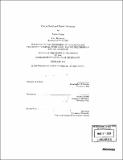Partial belief and expert testimony
Author(s)
Briggs, Rachael (Rachael Amy)
DownloadFull printable version (5.289Mb)
Other Contributors
Massachusetts Institute of Technology. Dept. of Linguistics and Philosophy.
Advisor
Robert Stalnaker.
Terms of use
Metadata
Show full item recordAbstract
My dissertation investigates two questions from within a partial belief framework: First, when and how should deference to experts or other information sources be qualified? Second, how closely is epistemology related to other philosophical fields, such as metaphysics, ethics, and decision theory? Chapter 1 discusses David Lewis's "Big Bad Bug", an argument for the conclusion that the Principal Principle-the thesis that one's credence in a proposition A should equal one's expectation of A's chance, provided one has no inadmissible information-is incompatible with Humean Supervenience-the thesis that that laws of nature, dispositions, and objective chances supervene on the distribution of categorical properties in the world (past, present, and future). I map out the logical structure of the Big Bad Bug, survey a range of possible responses to it, and argue that none of the responses are very appealing. Chapter 2 discusses Bas van Fraassen's Reflection principle-the thesis that one's current credence in a proposition A should equal one's expected future credence in A. Van Fraassen has formulated a diachronic Dutch book argument for Reflection, but other authors cite counterexamples to Reflection that appear to undermine the credibility of diachronic Dutch books. I argue that a suitably qualified version of Reflection gets around the counterexamples. I distinguish between Dutch books that reveal incoherence-like the diachronic Dutch book for conditionalization-and Dutch books that reveal a type of problem I call selfdoubt. I argue that violating Reflection is a type of self-doubt rather than a type of incoherence. (cont.) Chapter 3 argues that the halfer and thirder solutions to Adam Elga's Sleeping Beauty problem correspond to two more general approaches to de se information. Which approach is right depends on which approach to decision theory is right. I use Dutch books and scoring rules to argue that causal decision theorists should favor the approach that corresponds to thirding, while evidential decision theorists should favor the approach that corresponds to halfing.
Description
Thesis (Ph. D.)--Massachusetts Institute of Technology, Dept. of Linguistics and Philosophy, 2009. Includes bibliographical references (p. [83]-86).
Date issued
2009Department
Massachusetts Institute of Technology. Department of Linguistics and PhilosophyPublisher
Massachusetts Institute of Technology
Keywords
Linguistics and Philosophy.